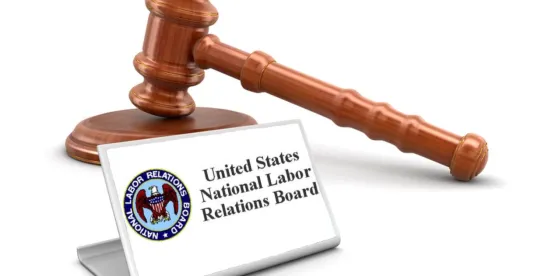While union organizing among students flourished under President Biden’s labor board, colleges and universities face unresolved issues, including compliance with other federal laws.[1] In Vanderbilt University v. National Labor Relations Board, Vanderbilt University (Vanderbilt) sought a preliminary injunction enjoining the application of certain National Labor Relations Board (NLRB or Board) regulations that Vanderbilt argued conflict with the Family Educational Rights and Privacy Act (FERPA). The District Court for the Middle District of Tennessee (District Court) granted the injunction, recognizing a conflict between the Board’s disclosure requirements and FERPA’s privacy protections.
FERPA and the NLRB Regulations
The friction between FERPA and NLRB regulations is not surprising. Our last update addressed the NLRB’s General Counsel (GC) memorandum from August 2024, which attempted to reconcile a higher education institution’s disclosure obligations under the National Labor Relations Act (NLRA) and FERPA. In its recent decision, the District Court noted an outright conflict between FERPA and NLRB regulations. Generally, FERPA forbids the disclosure of student information from educational records without written consent unless an exception applies, such as when a student is given timely notice of a subpoena and the opportunity to initiate protective action. Failing to comply with FERPA presents a significant risk—losing federal funding. However, failing to comply with NLRB regulations could result in NLRA violations or preclude an institution from using certain defenses or strategies in a union election proceeding. The District Court recognized that FERPA protects student privacy rights, namely unauthorized disclosures of certain educational records and personal identifying information contained therein, but NLRB regulations enable unions and the Board access to certain personal identifying information for collective bargaining purposes and union elections. The District Court summarized the issue as a “seemingly impossible Morton’s Fork: either comply with those [NLRB] regulations and lose federal funding for violating its students’ privacy; or not comply and face punishment during union election proceedings.”
Vanderbilt University v. National Labor Relations Board
Vanderbilt is a 501(c)(3) FERPA-covered private university that accepts federal funding. The Vanderbilt Graduate Workers Union United, International Union, UAW (Union) filed a representation petition with Region 10 of the NLRB to represent 2,200 graduate student employees. NLRB regulations allow employers, upon filing a petition, to submit a statement of position (SOP), but that SOP must include, among other things, “a list of the full names, work locations, shifts, and job classifications in the proposed unit.” If the SOP omits information, an employer is precluded from raising any issue, offering any evidence, cross-examining witnesses, or presenting any argument related to the omitted information at the hearing concerning the petition. Vanderbilt argued that it had competing obligations—provide student information per the Board regulations or protect against unapproved disclosure and use of student education records under FERPA. After the Regional Director issued a subpoena directing Vanderbilt to provide the NLRB-required information, the university provided affected students an opportunity to object under FERPA. FERPA allows institutions to release protected records with students’ consent or in response to a lawfully issued subpoena, so long as affected students are given timely notice and an opportunity to take protective action. Over 80 students objected to the subpoena. After another subpoena, Vanderbilt again notified affected students, but it received even more objections. Two graduate students filed a request to intervene directly with the Board proceeding and a motion to stay enforcement of the subpoena to provide time to present their objections. The Regional Director later denied Vanderbilt’s motion to postpone the hearing, the SOP, and its response to the subpoena and further denied the students’ request to intervene and the motion to stay. The two students filed an emergency appeal to the Board. At the same time, Vanderbilt sought emergency expedited relief from the Board to avoid disclosing students’ FERPA-protected information before their objections were adjudicated.
Ultimately, Vanderbilt complied with the subpoena, filing its SOP with redacted student information. At the hearing concerning the petition, the Union moved to preclude Vanderbilt from presenting evidence or arguments contesting the appropriateness of the proposed union or any individual’s eligibility because the SOP did not provide full names. Vanderbilt opposed the Union’s motion for preclusion, arguing the redacted information was FERPA-protected. Eventually, at the Regional Director’s instruction, the hearing officer precluded Vanderbilt from offering evidence or argument on the unit’s appropriateness because it did not provide the required information and precluded Vanderbilt from offering proof regarding the evidence it would have presented.
Vanderbilt requested the District Court issue a preliminary injunction enjoining the Board from enforcing three regulations that essentially present a catch-22 when considered alongside FERPA obligations. Namely, the regulations forced a FERPA violation by disclosing protected personally identifiable information, which would penalize Vanderbilt for FERPA compliance by precluding evidence or argument about the unit’s appropriateness.
The Court Finds A Preliminary Injunction Necessary
The Court ultimately found the regulations contrary to FERPA and thus “not in accordance with law” under the Administrative Procedures Act (APA).[2] The Court granted immediate injunctive relief based on the four factors considered for an injunction, detailed below.
1. Vanderbilt had a Strong Likelihood of Success on the Merits
The Court concluded Vanderbilt is likely to succeed on the merits of its claim that the Board is applying the regulations in a manner not in accordance with the law, particularly because the application directly conflicts with Vanderbilt’s FERPA obligations and penalizes it for compliance. The particular requirements of the NLRB regulations and FERPA illustrate Vanderbilt’s conflict.
The three NLRB regulations at issue provide that:
A statement of position must contain “a list of the full names, work locations, shifts, and job classifications of all individuals in the proposed unit[;]”
If a party fails to “timely furnish the lists of employees,” the employer is “precluded from contesting the appropriateness of the proposed unit” and “from contesting the eligibility or inclusion of any individuals at the pre-election hearing, including by presenting evidence or argument, or by cross-examination of witnesses[;]”
Absent extraordinary circumstances, an employer must provide the Regional Director, within two business days after issuance of direction, “a list of the full names, work locations, shifts, job classifications, and contact information (including home addresses, available personal email addresses, and available home and personal cellular “cell” telephone numbers) of all eligible voters.”
At the same time, FERPA provides (absent exception to disclosure under particular circumstances) that:
[n]o funds shall be made available under any applicable program to any educational agency or institution which has a policy or practice of permitting the release of education records (or personally identifiable information contained therein other than directory information . . . ) of students without the written consent of their parents to any individual, agency, or organization[.]
The Court found Vanderbilt likely to succeed in showing FERPA protections apply to student information NLRB regulations require for disclosure and that the university would be forced to enact a “policy or practice” of disclosure during election proceedings. According to the Court, the information required by the regulations to avoid preclusion, including the voter list related to students and maintained by Vanderbilt, constitutes education records or personally identifiable information. The Court concluded the information, such as work locations, shifts, job classifications, and personal email addresses, did not constitute “directory information,” which FERPA permits an institution to disclose.
The Court held that the Board’s application of the regulations to Vanderbilt clearly conflicted with FERPA obligations. The Court noted that even if the Board adequately contested Vanderbilt’s claim under FERPA’s subpoena exception, the argument would likely fail because of the Board’s strict application, i.e., the Board did not give Vanderbilt a significant opportunity to allow students to seek protective action in response to the subpoena before mandating disclosure. The Court also noted that the Board failed to make a meaningful effort to agree on an accommodation to honor Vanderbilt’s concerns, as the GC recommended, or follow any other related guidance to facilitate compliance and consent procedures. The Court noted that Vanderbilt could not comply with FERPA and the regulations as currently written during the election proceeding and that “a valid statute always prevails over a conflicting regulation.” Therefore, the Court concluded Vanderbilt will likely succeed in its APA claim that the regulations are not in accordance with FERPA.
2. Vanderbilt Would Suffer Irreparable Injury
The District Court also found that Vanderbilt would suffer irreparable injury without an injunction. The Court noted Vanderbilt suffered harm from a previous preclusion order and would continue to suffer if forced to participate in election proceedings governed by regulations that required the university to choose between rights in NLRB proceedings and federal obligations. The Court emphasized the threat of Vanderbilt losing federal funding if forced to continue to comply with the election. Accordingly, given the past harm Vanderbilt experienced—which would continue to pervade—and the potential loss of funding, the Court found irreparable injury.
3. The Third and Fourth Factors Proved Neutral
As for the remaining factors—whether issuance would cause substantial harm to the opposing party or others and the public interest—the Court noted its neutrality. On the one hand, the Court acknowledged that Congress gave the NLRB significant power to regulate election proceedings and that an injunction could delay administrative proceedings, cause confusion regarding the proper application of the regulations, and deprive students of the ability to unionize quickly. However, the Court also noted Vanderbilt’s significant likelihood of success on the merits, which strongly indicated that a preliminary injunction would serve the public interest as “there is generally no public interest in the perpetuation of unlawful agency action.” The Court noted that granting relief would likely benefit over 100 students who objected to disclosing FERPA-protected information. While Congress enacted the NLRA and created the NLRB with specific objectives to not be infringed upon, the Court gave great weight to the fact that Congress similarly intended to protect the privacy rights of students under FERPA—students objected under the rights delegated by Congress. Those rights should not need to be set aside for agency expediency.
After balancing those factors and considering the irreparable harm, the Court found the circumstances warranted a preliminary injunction and narrowly tailored the scope by enjoining the Board from applying and enforcing the regulations to Vanderbilt in a way that violates the APA or FERPA. Shortly after the Court’s decision, the Union withdrew its petition.
What’s to Come
As the Courts and the Board navigate these challenges, the very legal foundation for students being able to unionize could face challenges under a Trump labor board. During President Trump’s prior term, the NLRB proposed but later withdrew regulations that would have excluded students at private universities from the NLRA’s definition of an employee. Will a Trump labor board reintroduce those proposed regulations? With the Senate failing to confirm Lauren McFerran to another term, Republican appointees will have a Board majority in early 2025. With precedent established by President Biden, Trump has already removed the General Counsel that President Biden appointed. In light of existing complex issues involving higher education, labor law, and other developments likely to come, colleges and universities should consult with competent legal counsel to stay abreast of these issues and prepare for any potential compliance obligations.
|




 />i
/>i

